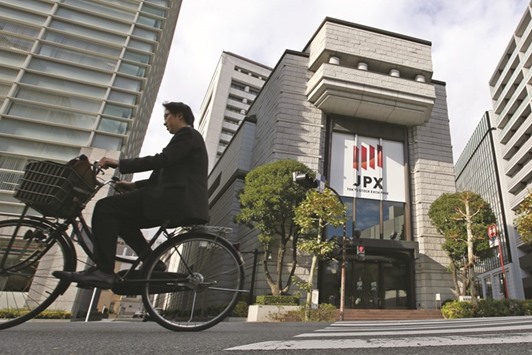After the wildest quarter for Asian equities since 2011, Hans Goetti is waiting to buy the dip.
Convinced a seven-week rally has run its course, the strategist at Banque Internationale à Luxembourg says the region’s stocks need to fall another 5% before he’ll jump in.
The MSCI Asia Pacific Index’s worst start to a year on record saw shares sink to a 3 1/2-year low on February 12, before joining a global rebound to end the quarter down 2.3%.
“Everything went from totally oversold in February to completely overbought within the space of 1 1/2 months,” said Goetti, the Dubai-based chief strategist for the Middle East and Asia for the bank, which has $40bn under management. “We’re recommending investors cut some of their positions now and try to buy at lower levels.”
Goetti is one of many cautious voices in the wake of market turbulence that blindsided global markets at the beginning of the year.
They view the advance that has lifted the Asia Pacific gauge 14% since February 12 as a temporary respite, with risks from China’s currency devaluations lingering and concern increasing that global profits are deteriorating. In Japan, stocks continue to be battered by the impact of a stronger yen.
Asian equities slid in January and February on concerns over China’s economic growth and the tumbling price of oil.
A move by the Bank of Japan to adopt negative interest rates sparked a selloff in financial shares, sending Tokyo stocks deeper into a bear market. At the height of the carnage, a volatility measure for the MSCI Asia Pacific Index climbed to the highest level since 2011.
Stocks rebounded in March as China markets stabilized and oil prices rose. The rally picked up speed after the Federal Reserve reassured investors it won’t rush to increase borrowing costs. The MSCI Asia Pacific gauge jumped 8.2% for the month, paring the quarter’s loss.
For Erik Ristuben, the quarter has been one long journey back to the start of the year. The chief investment strategist at Russell Investments Management Co, which oversees about $242bn, says the key to the market’s direction will be corporate profits.
“What you saw so far this year was a recessionary scare, an overreaction and oversold situation in equities,” Ristuben told Bloomberg TV. “You’ve rallied back to basically flat and now everyone is going to want to see earnings.”
Investors are bracing for a lackluster earnings season as the recent rout in commodities prices and negative interest rates weigh on results.
Sean Darby at Jefferies Group LLC believes the outlook isn’t all that bad as commodity prices rebound. He suggests expectations for earnings are too low and will need to be revised up.
“Markets may actually do quite well over the next couple of weeks mainly because we have had some big changes in some of the assumptions on things like oil, commodity prices and growth,” said Darby, chief global equity strategist in Hong Kong at Jefferies Group. “There’s still quite a lot of money on the sidelines, actually.” Mark Lister at Craigs Investment Partners in Wellington shrugs off the recent equities rally, saying stocks are currently at the top end of a trading range.
“The rally isn’t sustainable and volatility will come back. There are still some genuine worries out there,” said Lister, head of private wealth research at Craigs, which manages about $7.2bn. “We’re still cautious on China and still expect more downward pressure on the Chinese currency, more devaluations.
The losers from that are some Asian countries that compete with China.”
He believes now is an opportunity for those who missed the earlier selloff to scale back on what he calls “problem sectors” such as emerging markets, mining and energy. Returns around Asia were mixed during the quarter. At one end of the spectrum were Southeast Asia’s markets, which soared 20% from a January low.
Chinese companies trading in Hong Kong entered a bull market on the final day of the quarter amid signs the nation’s economy and currency are stabilising.
At the other end were shares in Japan, where the Topix index lost 13% for the quarter.
Central banks remain a wild card in the months ahead. While the Fed’s dovish take on interest rates bolstered stocks this week, markets are sensitive to any shift in positions on global stimulus.
“Where we go from here is a little more difficult to figure out,” said Tatsushi Maeno, head of Japanese equities at Pinebridge Investments Japan Co in Tokyo. “The Fed probably won’t move in April. On whether they’ll move in June, if talk of that starts to gain momentum, the market may not be able to rise again.”
Mikio Kumada, a Hong Kong-based global strategist at LGT Capital Partners, said he won’t be truly optimistic until he sees a more clear and aggressive approach by central banks, as well as more definitive signs of strength in the economy.
In the meantime, the market “is not very stable and can be spooked easily. And that’s what we saw happen this quarter,” said Kumada. “It’ll be a volatile period going forward as well.”

A man cycles past the Tokyo Stock Exchange. A move by the Bank of Japan to adopt negative interest rates sparked a selloff in financial shares, sending Tokyo stocks deeper into a bear market.
